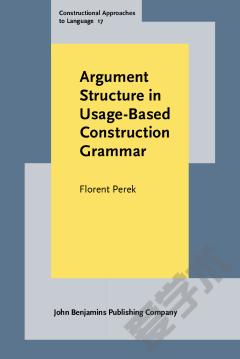Argument Structure in Usage-Based Construction Grammar. Experimental and corpus-based perspectives.
The argument structure of verbs, defined as the part of grammar that deals with how participants in verbal events are expressed in clauses, is a classical topic in linguistics that has received considerable attention in the literature. This book investigates argument structure in English from a usage-based perspective, taking the view that the cognitive representation of grammar is shaped by language use, and that crucial aspects of grammatical organization are tied to the frequency with which words and syntactic constructions are used. On the basis of several case studies combining quantitative corpus studies and psycholinguistic experiments, it is shown how a usage-based approach sheds new light on a number of issues in argument realization and offers frequency-based explanations for its organizing principles at three levels of generality: verbs, constructions, and argument structure alternations.
{{comment.content}}








 京公网安备 11010802027623号
京公网安备 11010802027623号